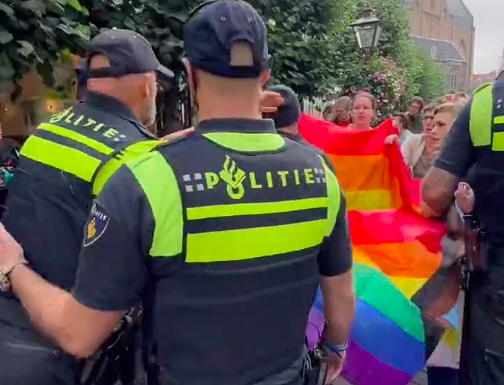Yesterday, for the second time in the Netherlands, there was an uproar surrounding a “reading hour” by drag queens, this time in Leiden. These reading aloud hours (so-called Drag Queen Story Hours) are increasingly organized in Dutch libraries, following the American example. The goal is to promote reading and diversity among children. In April, there was uproar over a similar read-aloud afternoon at a library in Rotterdam.
FVD MP Gideon van Meijeren was in Leiden yesterday, carrying a banner that read, “Don’t make normal what is not normal. Stop the sexual indoctrination of our children”. In response, protesters with rainbow flags gathered, shouting cries of “Never again fascism.” The municipality of Leiden felt compelled to declare an emergency ordinance due to rising tensions. This situation is indicative of the polarization around LGBT emancipation, where the parties are increasingly diametrically opposed.
In media coverage, it is striking that little effort is made there to understand the critics of read-alouds. They are quickly dismissed as homophobic, transphobic and far-right. And that while a party like FVD is making legitimate and important criticisms of what they call the “woke culture.”
They also correctly pointed out in their criticism of Spring Fling Week that under the guise of diversity and emancipation, all sorts of questionable ideas are being forced on children about sex, gender and sexuality. These include excessive sexualization and rampant social engineering. Similar criticism also goes for some read-alouds.
The great danger of the current polarization is that it could jeopardize vulnerable LGBT emancipation. With the encroaching woke culture, there is also increasing “rainbow fatigue” in the Netherlands, causing large groups of people to turn against the entire LGBT empowerment agenda, not just the woke excesses.
Read more about growing rainbow fatigue in the Netherlands:
Denying the biological reality of male and female only encourages transphobia
With regard to reading afternoons, the idea is growing among critics that draq queens are bad for children at all, and that reading hours should be banned altogether. But read alouds are, of course, potentially very fun ways to engage children with diversity.
The ball is now in the court of the LGBT community itself: they will have to take action now to prevent polarization from continuing. That starts with stopping the one-sided dismissal of critics as homophobic, and recognizing that reading to children on this topic carries a special responsibility. Some things to consider here:
- Drag culture originated in the nightlife of major cities. Drag queens are great at theatrical entertainment and this is also welcome during read-alouds. But of course, a library with children is a different setting than a nightclub. So drag queens have a responsibility to leave the sex, drugs & rock’n’roll at home when they are among children. No deep cleavages or over-sexualized outfits, no lewd jokes and innuendo, etc.
- The read-aloud books themselves will need to be critically evaluated. There are some very nice children’s books about/with diversity, but also some curious ones. Diversity in children’s books is nice, but sexualization or the imposition of radical woke thought is not a good idea. So no pictures of fetish-related things in children’s books, and also treat the topic of transgender and gender neutrality with restraint. It is fine to show that this group of people exists, but that is different from actively promoting things like gender reassignment or changing pronouns. Children’s books should not contribute to denying the biological reality of the distinction between male and female, and to denying that majorities and minorities do exist.
It is high time that the LGBT community stepped out of the victim role, introspected about radical elements in its own ideology, and took responsibility for not bothering the rest of society, especially children, with it.
With the Amsterdam Gender Theory Research Team, we are working on ways in which more moderate positions can be taken in discussions about gender and sexuality, including by the LGBT community itself. We will also return to the case of read-alouds by drags in the near future.

Leave a Reply